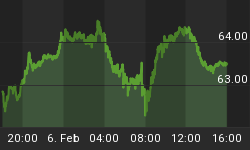Last month I had the pleasure of sitting down to an exclusive interview with famed investor and best-selling author, Jimmy Rogers. Among the topics we discussed were China, commodities, the U.S. dollar, and Gold. The forty-five minute, extremely candid and highly provocative interview consisted of my asking and Jim answering ten questions, as well as follow-up questions and discussions between the two of us. I then condensed the interview into a sixteen-page special report, an excerpt from which is reproduced below. To read the entire interview, download your free copy of the special report at https://www.europac.net/report/index_rogers.asp?s=euroweb.
Peter Schiff:
Which brings me to my next question: your outlook on gold? You've always viewed gold differently from other commodities. Why?
Jim Rogers:
The supply and demand dynamics for gold have been different from other commodities for two or three decades. I own some gold, but I've always tried to explain to people that they would make more money in other commodities than they would in gold, because of the supply and demand dynamics. Now that has been true for the last decade or so. For lead, in fact, you would have made a lot more money over the past thirty years, the past twenty years, the past ten years, than you would have in gold. But if you own gold, I still don't expect to make as much in gold as I would in things like corn and soy beans. But I own it. However, if I were looking at commodities these days, I would look at things like agriculture, because agriculture, for the most part, has moved up less than metals or anything. You know, cotton is still 50% below its all time high. Soy beans are something like 60% from the all time high. There are fundamental changes taking place. The amount of acres devoted to wheat around the world has been declining for 30 years. The world has consumed more corn than it has produced for five years in a row. That's never happened in recorded history. The worldwide inventories are low, on a historic basis. And that's without a drought. We haven't had a major drought anywhere in the world for some time. We used to have them all the time. Will we never have a drought again? I doubt it. And, by the way, increasing agricultural production is not as simple as just planting as few seeds. Take coffee, for instance. It takes five years for a coffee tree to mature. If you and decided to go into the coffee business today, it would take our plantation a long time to come on stream and mature. You don't snap your finger, and magically fruit tress cotton plants, soy bean bushes appear. And in the meantime, the price of everything those farmers use is skyrocketing: natural gas, diesel fuel, labor, insurance, etc. Everything they use to produce their products it is also going up in price. So it takes a high price for them to start bringing on marginal land to produce new and more products.
Peter Schiff:
Let's talk specifically about commodities and energy. To what extant can technology and alternative fuels rescue us from the commodity and energy shortage? I'm thinking about nanotechnology, nuclear power, gas hydrogenation to provide clean-burning coal, solar energy, etc.
Jim Rogers
Yes, technology can help, of course. But all these new innovations take enormous amounts of time to be developed and enter the marketplace. Eventually this commodity bull market (which includes energy) will come to an end, Peter. If history is any guide, some time between 2014 and 2022, the bull market in commodities will come to an end. That's based on history, that is not a prediction. The average commodity bull market has lasted about eighteen years. Something eventually causes it to come to an end. Let's look at alternative energy sources, for example. If we all decided today we wanted to have wind power, we couldn't. You can't get windmills. You can't change the world that quickly. And solar is not competitive right now. Eventually it might be. But if we all decided today, Peter, to have solar panels on our roofs, you can't get them. You can't change that quickly. Nuclear of course, is making a come-back. But it takes years to build a nuclear power plant. And remember in the mean time the old plants are all becoming obsolete. The power plants in America are thirty to forty years old. So by the time a new one comes on stream, those plants will be forty or fifty years old. There has been massive underinvestment in things like mining, oil exploration and agricultural development. Agricultural land is left fallow. Plantations give way to real estate development. Renewing commodity infrastructure, finding new sources of commodities, new oil fields, developing new plantations takes lots of time...years in many cases. Only one new lead mine opened in the world in twenty-five years! Technological changes are coming, of course. But it just takes a long, long time. We don't reverse these things quickly. Almost every oil country in the world has got declining reserves. All the major oil companies are quite open about the fact that they are not replacing their reserves, not by discoveries anyway or development. Maybe they're buying other oil companies. But that's not increasing the amount of oil in the world. There's going to be something to cause this bull market to come to an end, someday, but the emphasis should be on someday, because someday is a long way, away.
To learn more about investing in internationally based commodity oriented stocks, download my free report The Powerful Case for Investing in Foreign Equities available at https://www.europac.net/report/index.asp?s=euroweb.
And subscribe to my free online newsletter at http://www.europac.net/newsletter/newsletter.asp.
To discover the best way to buy gold visit www.goldyoucanfold.com.















